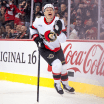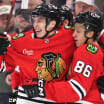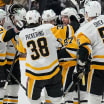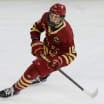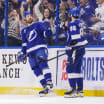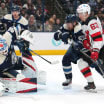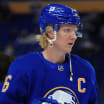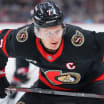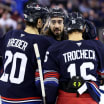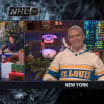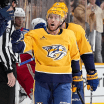Rick MacLeish, who scored what is regarded as the most important goal in the history of the Philadelphia Flyers, died Monday. He was 66.
"With the passing of Rick MacLeish, the Flyers have lost one of their legends," Philadelphia president Paul Holmgren said Tuesday. "A good father, grandfather, teammate and friend, Rick will be missed by all who were fortunate to come and know him over the years. His happy and friendly demeanor was front and center everywhere Rick went. Today our thoughts and prayers are with Rick's wife, Charlene, his daughters Danielle and Brianna, along with his grandchildren. May he rest in peace."
MacLeish, Cup winner with Flyers, dies at 66
First Philadelphia player to score 50 goals, won championship in '74, '75
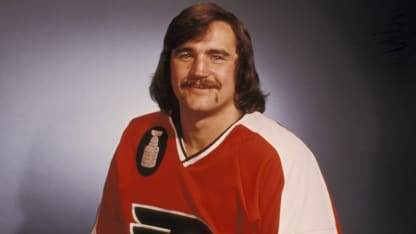
© B Bennett/Getty Images
The Philadelphia Inquirer reported May 13 that MacLeish, nicknamed "Hawk," "Cutie," "Bedrock" and "Pink Floyd" at various times by his Flyers teammates, had been hospitalized with unspecified health issues.
"We deeply appreciate all the support that's been given to our dad," Brianna MacLeish told the newspaper then. "At this time we want to spend time with our dad and the family asks for our privacy."
MacLeish's death is the second major loss for the Flyers this year. Founding owner and chairman Ed Snider died April 11 at age 83.
Word of MacLeish's death came hours after news that former Atlanta Flames and Chicago Blackhawks forward Tom Lysiak died of leukemia at age 63.
It was with a single deflection on May 19, 1974 at the Spectrum, in Game 6 of the Stanley Cup Final, that MacLeish became a Flyers legend, tipping a shot by teammate Andre "Moose" Dupont past Boston Bruins goaltender Gilles Gilbert.
MacLeish's goal at 14:48 of the first period would stand in front of a shutout by goaltender Bernie Parent to give the Flyers a 1-0, Stanley Cup-clinching win. It was the first of two consecutive championships.
The goal was one of 381 MacLeish scored for the Flyers. His 328 in the regular season are sixth in Flyers history, and his 53 Stanley Cup Playoff goals are tied with Hockey Hall of Fame member Bill Barber for first.
MacLeish, born Jan. 3, 1950 in Lindsay, Ontario, was selected with the fourth pick of the 1970 NHL Draft by, coincidentally, the Bruins.
The Flyers acquired MacLeish before he played a game for the Bruins, on Feb. 1, 1971, sending veteran center Mike Walton to the Bruins in a trade for MacLeish and left wing Danny Schock.
MacLeish wasn't an overnight sensation, but his fearsome wrist shot in time would make him a hero in Philadelphia.
The sniper-to-be scored two goals in his first 26 games with the 1970-71 Flyers, having spent most of that season with Oklahoma City of the Central Hockey League.
After scoring one goal in 17 games to begin the 1971-72 NHL season, MacLeish was sent to Richmond of the American Hockey League.
It was there that MacLeish honed his all-around game and began to rediscover a shooting eye that allowed him to score 95 goals in 108 games in his final two seasons of junior hockey, 1968-70 with Peterborough of the Ontario Hockey League.
MacLeish scored 24 goals in 42 AHL games in 1971-72, which earned him another chance with the Flyers at the start of the 1972-73 NHL season. It was then his career took off in a big way.
In 78 games that season, with veteran Gary Dornhoefer on his right wing and rookie Barber on his left, MacLeish became the first Flyers player to score 50 goals. He also had 50 assists and a League-leading 21 power-play goals.
"Ricky, Ross [Lonsberry] and I played on a line together for five or six years," Dornhoefer said. "I'll tell you what, he was probably the fastest player on the ice. As far as a wrist shot is concerned, there was no one better at getting that shot away and accurate. Ross and I would talk and say, 'Let's just give Ricky the puck and he'll put it in.' If you look at the amount of goals he scored, well, that's why we kept giving him the puck. Ross and I had cement hands, so we'd pass the puck to him. The Flyers could have a mediocre game but because of his skills as a player and the athlete that he was, he could carry us; he was that gifted.
"I always felt that during the years he played he never got the recognition that he properly deserved. He was that good. It saddens me that he was such a young man and is no longer with us. That really hurts."
MacLeish followed his 50-goal season with seasons of 32, 38 and 22 goals before scoring 49 in 1976-77.
"Rick was probably the most gifted, natural centerman that the Flyers have ever had," teammate Bob Kelly said. "He was a tough kid who skated and worked hard. Although he played in the shadow of [Bobby Clarke], he was every bit as good as Clarkie. Clarkie was more of a natural leader where Rick was just quiet and simply went out there and played his heart out. He was a great guy and it is very sad that we had to lose him at such an early age."
MacLeish was the most prolific member of Philadelphia's back-to-back Stanley Cup championship teams in 1974 and 1975. He led the playoffs in goals (13) and points (22) in 1974, and in points (20) in 1975.
Torn knee ligaments kept MacLeish out of the 1976 Cup Final, one of the reasons the Flyers were swept by the Montreal Canadiens.
"Though he was primarily a skill player, MacLeish was prepared to take the physical beating necessary to win," hockey historian Joe Pelletier wrote. "With that approach comes injuries, though nothing could have prepared him for the injury suffered in 1977-78. While killing a penalty his neck was accidentally sliced by the skate Los Angeles Kings ace Marcel Dionne. It took 180 stitches to close that nasty gash."
MacLeish's time with the Flyers ended July 3, 1981, when he was traded to the Hartford Whalers with Blake Wesley, Don Gillen and the Flyers' first-, second- and third-round picks in the 1982 NHL Draft, for Ray Allison, Fred Arthur and the Whalers' first- and third-round choices in the 1983 draft.
MacLeish played with Hartford and the Pittsburgh Penguins 1981-82 and split the 1982-83 season between the Penguins and Kloten in Switzerland. He signed with the Flyers as a free agent in 1983-84 but was traded in January 1984 to the Detroit Red Wings for future considerations. He finished his career with 10 points in 25 games with the Red Wings.
In retirement in Philadelphia, MacLeish dabbled in insurance and financial services as well as in harness racing, and was involved with the Flyers alumni association.
"I would say that Rick MacLeish was probably one of the most naturally skilled players that the Flyers have ever had in their history of 50 years," teammate Joe Watson said. "I'd put him up there with [Claude] Giroux, [Eric] Lindros and [Peter] Forsberg in terms of natural skill. He was a great player and we'll certainly miss him."


